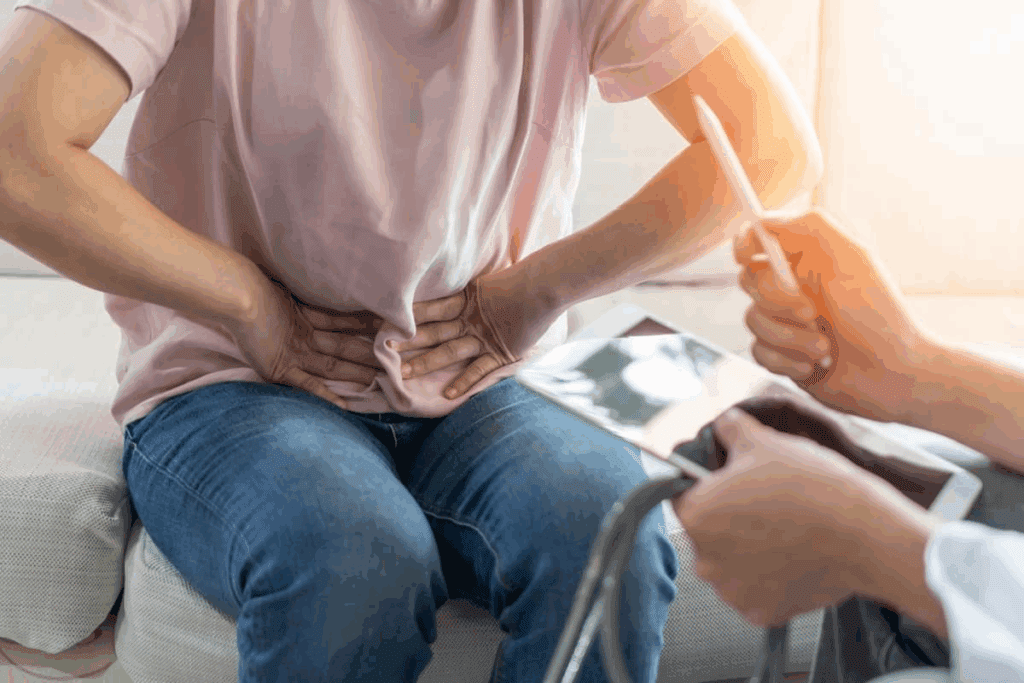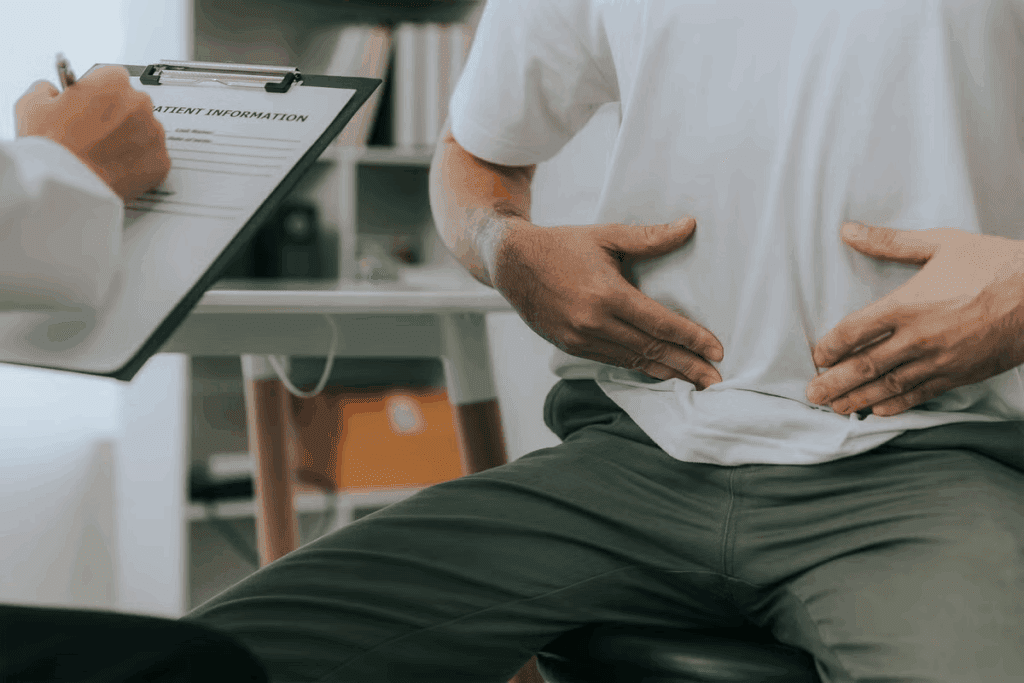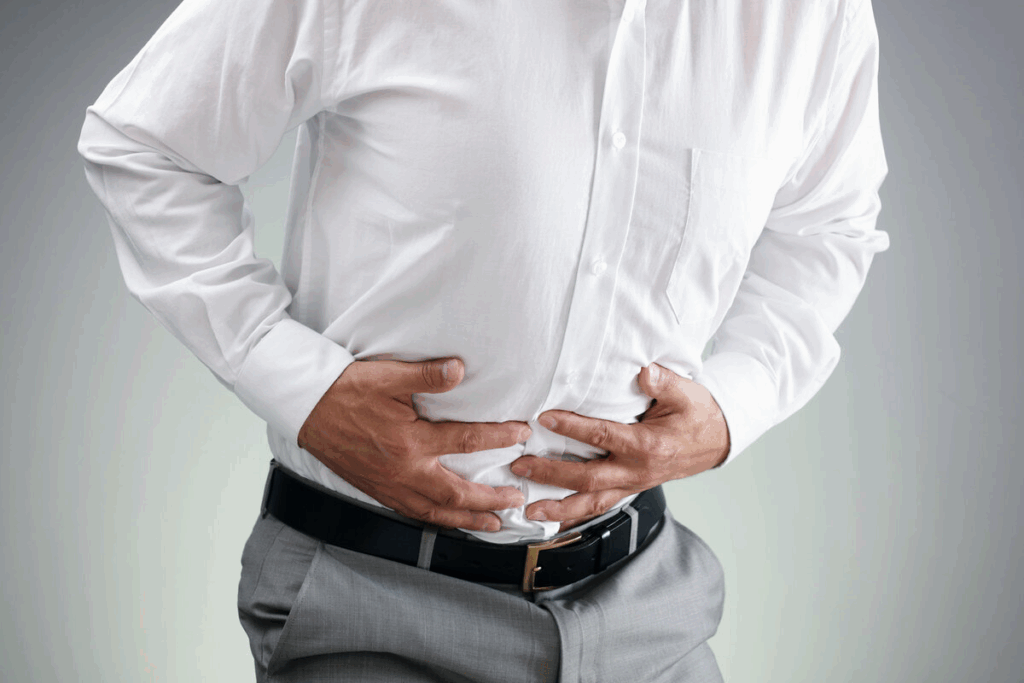
Kidney stones, also known as nephrolithiasis or renal calculi, affect a significant portion of the global population. At Liv Hospital, we recognize that these hard, crystallized mineral deposits can create a complex relationship with the gastrointestinal system. Many patients wonder, can kidney stones cause gastrointestinal problems, as the symptoms and effects often overlap.
Kidney stones are known for causing intense pain in the urinary tract. But their impact doesn’t stop there. They can also affect overall health, including bowel movements and trigger various gastrointestinal issues.
Understanding the connection between kidney stones and gastrointestinal health is key for patient care. We’ll discuss the definition, types, and prevalence of kidney stones. We’ll also look at their effects on the digestive system.
Key Takeaways
- Kidney stones can affect gastrointestinal health beyond causing urinary tract pain.
- The prevalence of kidney stones is significant, impacting around 12% of the global population.
- Understanding the complex relationship between kidney stones and bowel movements is essential.
- Gastrointestinal problems triggered by kidney stones can significantly impact quality of life.
- Comprehensive care for patients with kidney stones involves addressing gastrointestinal issues.
Understanding Kidney Stones: A Common Health Concern

Kidney stones are hard deposits made of minerals and salts. They form inside the kidneys. Their occurrence is influenced by various factors. These stones can vary significantly in size and composition, leading to different types with distinct causes and consequences.
Definition and Types of Kidney Stones
Kidney stones are typically made of calcium oxalate, calcium phosphate, uric acid, or struvite. Each type of stone has different risk factors and may require different preventive measures.
- Calcium oxalate stones are the most common type, often associated with dietary factors and certain metabolic conditions.
- Uric acid stones can form in people who lose too much fluid because of chronic diarrhea or malabsorption, those who eat a high-protein diet, and those with diabetes or metabolic syndrome.
- Struvite stones are typically associated with urinary tract infections (UTIs) and can grow large enough to fill the renal pelvis.
Prevalence and Risk Factors in the United States
The prevalence of kidney stones has been increasing over the years in the United States. Research indicates that approximately 10% of adults will experience a kidney stone at some point in their lives.
| Risk Factor | Description |
| Diet | High intake of sodium, animal protein, and oxalate-rich foods |
| Family History | Having a family history of kidney stones increases the risk |
| Dehydration | Inadequate fluid intake leading to concentrated urine |
| Medical Conditions | Conditions like hyperparathyroidism, cystic kidney diseases, and certain gastrointestinal disorders |
Understanding these risk factors is key for prevention and management. By identifying and mitigating these risks, individuals can reduce their likelihood of developing kidney stones.
The Anatomy Connection: How Kidney Stones Interact with the Digestive System

The urinary and digestive systems are closely linked, which helps us understand how kidney stones impact our gut health. Their close location in the abdominal cavity is key to how kidney stones and digestive processes interact.
Proximity of Urinary and Digestive Systems
The urinary and digestive systems are right next to each other in the belly. The kidneys, where stones form, are near the intestines and pancreas. This close setup means pain from kidney stones can be felt in other parts of the body, not just the urinary system.
This close relationship can cause severe pain from kidney stones to affect bowel function. It can also lead to nausea and vomiting in some cases.
Shared Nerve Pathways Between Systems
The nerves that carry pain signals from the kidneys and digestive organs overlap. This makes it hard to tell where the pain is coming from. This overlap is why patients with kidney stones often feel pain in other parts of their body.
“The pain from a kidney stone can be so severe that it activates the nervous system, potentially affecting bowel function and causing changes in bowel movements.”
Medical Expert
Referred Pain Mechanisms
Referred pain happens when we feel pain in a different place than where it’s happening. For kidney stones, this pain is often felt in the lower back or belly. This can be mistaken for stomach problems. The reason is that pain signals from different parts of the body can end up in the same spinal neurons.
| Mechanism | Description | Effect on Patient |
| Shared Nerve Pathways | Nerves from kidneys and digestive organs converge | Referred pain, confusion between urinary and GI symptoms |
| Proximity of Organs | Urinary and digestive systems are closely located | Pain from kidney stones felt in abdominal areas |
| Nervous System Activation | Severe pain activates nervous system | Potential effects on bowel function and movement |
It’s important to understand these mechanisms to diagnose and treat kidney stone patients with GI symptoms. By knowing how the urinary and digestive systems are connected, doctors can provide better care for these patients.
Common Gastrointestinal Symptoms Associated with Kidney Stones
Kidney stones can lead to various gastrointestinal symptoms. These symptoms can greatly affect a person’s quality of life. Digestive issues often accompany kidney stones, causing distress.
Nausea and Vomiting
Nausea and vomiting are common in patients with kidney stones. The pain from kidney stone attacks can make it hard to keep food or fluids down. In severe cases, this can lead to dehydration, making the condition worse.
Abdominal Pain and Discomfort
Abdominal pain is a frequent symptom in kidney stone patients. The pain can vary from mild to severe, sometimes feeling like sharp pains in the lower back or groin. It’s important to get medical help to rule out other digestive problems.
Loss of Appetite
Many with kidney stones experience a decrease in appetite. This is due to the discomfort and pain. It’s important to eat a balanced diet, even if it’s in smaller, more frequent meals.
Bloating and Gas
Bloating and gas are also symptoms of kidney stones. These can be caused by changes in bowel movements and the body’s response to the stone. In some cases, these symptoms can be very uncomfortable, making the condition worse.
Adults who have their first kidney stone are more likely to get irritable bowel syndrome within six months. This shows how kidney stones and digestive health are connected.
Kidney stones can cause symptoms like bloating and abdominal discomfort. The sharp pains from kidney stone attacks can also affect digestion. Understanding these connections is key to managing both kidney stones and digestive symptoms.
Can Kidney Stones Cause Gastrointestinal Problems? The Scientific Evidence
New studies suggest kidney stones might be linked to stomach issues more than we thought. We’ll look at the science behind this, focusing on research and how it works.
Research Findings on Kidney Stone-Related GI Symptoms
People with kidney stones often feel sick to their stomach, vomit, and have belly pain. A study in the Journal of Urology found a strong link between kidney stones and stomach problems.
| Study | GI Symptoms Reported | Correlation with Kidney Stones |
| Journal of Urology | Nausea, Vomiting, Abdominal Pain | Significant |
| European Urology | Bloating, Gas, Loss of Appetite | Moderate |
“The relationship between kidney stones and gastrointestinal symptoms is complex and multifactorial, involving both direct and indirect mechanisms.”
Medical Expert, Urologist
Mechanisms Behind GI Disturbances
The reasons for stomach problems in kidney stone patients are many. Severe pain can slow down digestion, causing nausea and vomiting. The gut-brain axis also plays a big role in how our stomach works.
Research shows kidney stones can cause many stomach symptoms. Eating less sodium and more water can help prevent stones. Knowing how kidney stones affect the stomach can help doctors treat patients better.
The Impact of Kidney Stones on Bowel Movements
Kidney stones and bowel movements are linked in complex ways. Stones can cause pain, which might change how often you go to the bathroom. This can lead to constipation, diarrhea, or changes in what your stool looks like.
Constipation and Kidney Stones
Constipation often goes hand in hand with kidney stones. The pain from stones can activate the nervous system, affecting your bowel movements. Also, pain meds like opioids can slow down your bowel, making constipation worse.
People with kidney stones might be more prone to constipation. This is because dehydration and certain diets are common in both conditions. Drinking enough water and eating well can help prevent constipation.
Diarrhea: Direct or Indirect Connection?
Diarrhea can also be a symptom for some with kidney stones. The exact reason is unclear, but inflammation from stones might upset your gut. This can change your bowel habits.
Conditions like Crohn’s disease can raise the risk of both kidney stones and diarrhea. It’s important to look at your overall health when linking kidney stones to bowel issues.
Changes in Stool Appearance
Kidney stones can sometimes change how your stool looks or feels. This might be due to meds, dehydration, or other gut issues.
Changes in stool can signal many health problems. If you notice persistent or severe changes, see a doctor for a check-up.
Kidney Stones and Irritable Bowel Syndrome: Exploring the Connection
Adults who have their first kidney stone might be more likely to get irritable bowel syndrome (IBS). New research has found a link between these two conditions. This has made people curious about how they might be connected.
Statistical Correlation Between Kidney Stones and IBS
Studies have found a link between kidney stones and IBS. A big study with 53,016 adults showed that kidney stones raise IBS risk by 29%. This is compared to those without kidney stones.
Taiwanese Study Findings on New IBS Cases
In Taiwan, a study over three years found something interesting. Adults with their first kidney stone were more likely to get IBS within six months. This suggests a possible link between kidney stones and IBS symptoms.
Shared Risk Factors and Mechanisms
The exact reasons for the link between kidney stones and IBS are not clear. But, some shared risk factors and pathways have been found. These include genetics, diet, and metabolic conditions that affect both kidney stones and gut health.
Clinical Implications for Patients with Both Conditions
For those with both kidney stones and IBS, treatment needs to cover both areas. Knowing about the connection between these conditions can help improve care. It might also lower the chance of more problems.
Rare but Serious: When Kidney Stones Lead to Bowel Complications
Bowel problems from kidney stones are rare but serious. They need quick medical help. Kidney stones mainly affect the urinary system. But, they can also harm the digestive system, causing serious issues.
Bowel Obstruction from Large Kidney Stones
Bowel obstruction is a rare but serious issue caused by large kidney stones. A big stone can block the bladder neck. This blockage can cause urinary retention and sometimes bowel obstruction.
Key factors contributing to bowel obstruction:
- Size and location of the kidney stone
- Blockage of the bladder neck
- Potential for urinary retention
Fistula Formation Between Urinary and Digestive Tracts
A fistula is a rare complication where the urinary and digestive tracts connect abnormally. This happens when a kidney stone damages nearby structures.
The formation of a fistula can lead to various symptoms, including:
- Pneumaturia (air in the urine)
- Fecaluria (feces in the urine)
- Recurrent urinary tract infections
Case Studies and Incidence Rates
Many case studies show bowel problems from kidney stones. These cases are rare but show the need for quick medical help for severe symptoms.
Notable findings from case studies:
| Condition | Incidence Rate | Common Symptoms |
| Bowel Obstruction | Rare | Abdominal pain, constipation |
| Fistula Formation | Very Rare | Pneumaturia, fecaluria |
In conclusion, bowel problems from kidney stones are rare but serious. They need quick medical help. Knowing about these complications helps patients and doctors get the right care fast.
Patient Experiences: Living with Kidney Stones and GI Symptoms
People with kidney stones often face GI symptoms that really hurt their quality of life. These symptoms can be anything from a little discomfort to really bad pain. They can make everyday tasks hard.
Common Patient Complaints and Concerns
Patients with kidney stones usually complain about nausea and vomiting, abdominal pain, and changes in bowel movements. These symptoms can be really upsetting. They worry a lot about what’s causing them and how it affects their health.
Many patients get upset because they don’t know how kidney stones affect their GI system. They want clear answers and help to deal with their symptoms.
Quality of Life Impact
Gastrointestinal symptoms with kidney stones really lower a patient’s quality of life. Even simple tasks become hard. It affects their overall health and happiness.
We’ve seen that patients with both kidney stones and GI symptoms often feel fatigued and anxious. This anxiety makes their symptoms worse. It creates a cycle of discomfort and worry.
Coping Strategies from Real Patients
Despite the challenges, many patients find ways to cope. They change their diet, drinking more water and avoiding foods that make GI symptoms worse.
Some patients find relief in stress management techniques like meditation and deep breathing. These not only help with symptoms but also improve their overall well-being.
By understanding what patients with kidney stones and GI symptoms go through, we can help them better. We can give them the tools and info they need to manage their condition.
Distinguishing Between Kidney Stone Symptoms and Other GI Conditions
It’s hard to tell if someone has kidney stones or another GI issue. Kidney stones can cause symptoms that look like other stomach problems. This makes it important to figure out the right diagnosis for the right treatment.
Differential Diagnosis Challenges
Differential diagnosis means finding out what’s causing symptoms that could be from more than one thing. Kidney stones can make symptoms that look like other stomach problems, like appendicitis or irritable bowel syndrome (IBS).
The pain from kidney stones can feel like it’s coming from other places, like the lower abdomen or groin. These are also common spots for stomach problems. This can make it hard to guess what’s wrong at first.
When to Suspect Kidney Stones vs. Primary GI Disorders
To tell if someone has kidney stones or a stomach problem, doctors look at symptoms, medical history, and test results. Signs that might point to kidney stones include:
- Severe, colicky pain radiating from the flank to the lower abdomen or groin
- Hematuria (blood in the urine)
- Nausea and vomiting accompanying the pain
- Urinary symptoms such as frequency, urgency, or dysuria
On the other hand, stomach problems might show up as changes in bowel habits, fever, or blood in the stool. Doctors need to do a thorough check-up and listen to the patient’s story to figure out what’s going on.
Red Flags That Require Immediate Medical Attention
Some symptoms need to be seen right away, no matter if they’re from kidney stones or a stomach problem. These include:
| Symptom/Sign | Possible Indication |
| Severe abdominal pain | Kidney stone obstruction or GI perforation |
| Fever with abdominal pain | Infection or abscess |
| Vomiting blood or black tarry stools | GI bleeding |
| Inability to pass urine or severe urinary retention | Urinary tract obstruction |
Spotting these warning signs is key to acting fast and avoiding bigger problems. Doctors should always think about both kidney stones and stomach issues when someone has belly pain or other symptoms.
Diagnostic Approaches for Kidney Stones with GI Manifestations
When kidney stones cause GI symptoms, finding the right diagnosis is key. A thorough diagnosis is needed to treat these symptoms well. This involves using many different tools.
Accurate diagnosis is key to tell kidney stone GI symptoms from other issues. This helps in giving the right treatment.
Imaging Techniques
Imaging is a big help in finding kidney stones. The main ways to do this are:
- Ultrasound: It’s easy to use and often the first choice for finding stones.
- Computed Tomography (CT) scans: They give clear pictures of the urinary tract and can spot stones and other issues.
- X-rays: Good for seeing certain types of stones, but not all.
Laboratory Tests
Laboratory tests are also very important. They help find the cause of kidney stones and GI symptoms.
These tests include:
- Urinalysis: Checks for blood, infection, or other problems in the urine.
- Blood tests: Looks at kidney function and for signs of infection or other issues.
- Stone analysis: If a stone is passed, analyzing it helps find the cause and prevent future stones.
Doctors say, “A detailed diagnostic plan is vital for treating kidney stones and GI symptoms.” This approach makes sure patients get care that fits their needs.
Treatment Strategies for Kidney Stones and Associated GI Symptoms
Treating kidney stones needs a detailed plan, even more so when GI symptoms are involved. It’s not just about the stones. We must also tackle the GI problems that affect a patient’s life quality.
Medical Management
For smaller stones, doctors often start with medical treatment. Medications like pain relievers and alpha-blockers help with symptoms. Alpha-blockers relax the ureter muscles, making it easier for stones to pass.
- Pain management through NSAIDs or opioids
- Alpha-blockers to facilitate stone passage
- Hydration and dietary adjustments
Surgical Interventions
For bigger stones or blockages, surgical interventions are needed. Common surgeries include:
- Shock Wave Lithotripsy (SWL): A non-invasive method that breaks stones into smaller pieces for urine passage.
- Ureteroscopy: A small scope is used to remove or break stones in the ureter.
- Percutaneous Nephrolithotomy (PCNL): A surgery for large stones, making a small incision in the back.
Addressing GI Symptoms
It’s key to treat GI symptoms linked to kidney stones. Anti-emetic medications help with nausea and vomiting. Anti-spasmodic drugs ease abdominal cramps and discomfort.
In summary, treating kidney stones and GI symptoms needs a full plan. This includes medical care, surgery when needed, and GI symptom treatment. Tailoring treatment to each patient improves outcomes and quality of life.
Conclusion: The Complex Relationship Between Kidney Stones and Digestive Health
It’s key to understand how kidney stones and digestive health are connected. This connection shows we need a full approach to care for patients with kidney stones. It’s about looking at the whole picture, not just one part.
Kidney stones can mess with the digestive system, causing nausea, pain, and changes in bowel habits. The link between the urinary and digestive systems is strong. This means we must consider both when treating patients.
Recognizing the tie between kidney stones and digestive health helps doctors create better treatment plans. These plans focus on the patient’s overall health. This way, patients can get better faster and live better lives.
Can kidney stones cause gastrointestinal problems?
Yes, kidney stones can lead to stomach issues. This includes nausea, vomiting, and pain in the abdomen. They can also change how you go to the bathroom.
How do kidney stones affect bowel movements?
Kidney stones can mess with your bowel habits. You might experience constipation, diarrhea, or changes in your stool. This is because of the pain and discomfort they cause. They can also block your bowel or lead to other problems.
Is there a link between kidney stones and irritable bowel syndrome (IBS)?
Research shows a link between kidney stones and IBS. They share risk factors and mechanisms. This means both conditions can develop together.
Can kidney stones cause heartburn or acid reflux?
Kidney stones might not directly cause heartburn or acid reflux. But, they can lead to symptoms that might include these issues in some people.
Do kidney stones cause blood in stool?
Rarely, kidney stones can cause bowel complications. This might lead to blood in your stool. But, it’s not a common symptom.
Can kidney stones affect the digestive system?
Yes, kidney stones can impact your digestive system. They can cause nausea, vomiting, and pain in your abdomen. They can also change your bowel movements. This is because of their location and shared nerve pathways with the digestive system.
Are gastrointestinal symptoms common in people with kidney stones?
Yes, people with kidney stones often experience gastrointestinal symptoms. These symptoms can greatly affect their quality of life.
How are kidney stones with gastrointestinal manifestations diagnosed?
Doctors use imaging like CT scans or ultrasounds to diagnose kidney stones. They also do lab tests to understand how these stones affect your GI system.
What are the treatment strategies for kidney stones and associated GI symptoms?
Treatment includes medical management and surgery. There are also specific ways to address GI symptoms. The goal is to manage the kidney stones and improve your quality of life.
Can kidney stones cause gastric problems?
Yes, kidney stones can lead to gastric issues. This includes nausea, vomiting, and discomfort in your abdomen. This is due to the complex relationship between your urinary and digestive systems.
FAQ
References
National Center for Biotechnology Information. Can Kidney Stones Cause Gastrointestinal Problems and Affect. Retrieved from https://www.ncbi.nlm.nih.gov/pmc/articles/PMC11491232/



































